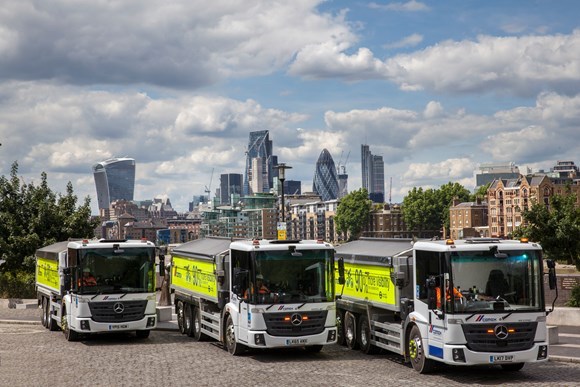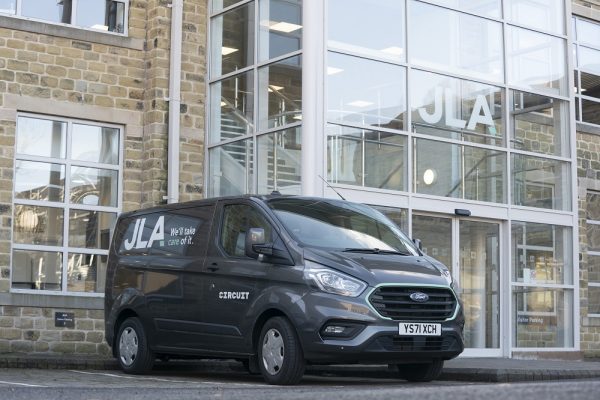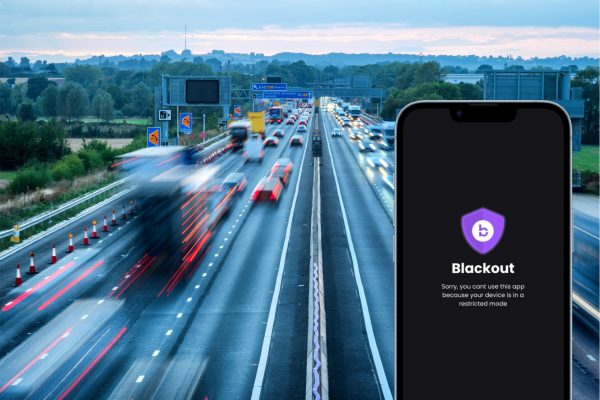Transport for London (TfL) is reminding heavy goods vehicle (HGV) operators to apply for a free safety permit as soon as possible, with less than two months to go until the introduction of London’s pioneering Direct Vision Standard. Enforcement will begin on 1 March, by which time all owners of HGVs over 12 tonnes – including those rated between one-star and five-star – will need to display a valid permit to continue operating the capital.
 TfL’s Direct Vision Standard will play a vital role in eliminating death and serious injuries from London’s streets. Introduced with the support of London Councils, it is set to reduce lethal blind spots by introducing a permit system for HGVs, assigning vehicles a star rating based on how much the driver can see directly through their cab window.
TfL’s Direct Vision Standard will play a vital role in eliminating death and serious injuries from London’s streets. Introduced with the support of London Councils, it is set to reduce lethal blind spots by introducing a permit system for HGVs, assigning vehicles a star rating based on how much the driver can see directly through their cab window.
The latest data from TfL shows that HGVs continue to be disproportionately involved in fatal collisions. Between 2018 and 2020*, HGVs were involved in 41 per cent of collisions where people cycling were killed and 19 per cent of collisions where a pedestrian was killed.
On average, HGVs were involved in 15 per cent of all road deaths over that period, despite making up just over three per cent of vehicle traffic in London. This means that HGVs are five times more likely to be involved in a collision resulting in a fatality, relative to their share of traffic. Each fatality has caused heartbreak and trauma for everyone involved, and each is an unacceptable tragedy. TfL is committed to creating a safer future for everyone in the capital.
From 1 March 2021, the Direct Vision Standard will operate 24 hours a day, seven days a week and will be enforced on all roads in London. HGVs will need to meet a minimum one-star rating to enable them to operate in the capital or will need to fit Safe System measures to improve the vehicle’s safety.
So far, more than 50,000 safety permits have been issued. However, there remain many thousands of HGVs on London’s roads whose operators have not yet applied for a required free safety permit. HGV owners are advised to check TfL’s online vehicle registration checker to see the star rating of their HGV and apply for a safety permit urgently if they have not already done so. While TfL will process all permit applications as quickly as possible, operators are advised that applications may take between 10 and 28 days to process.
A tighter Low Emission Zone (LEZ) standard will also come into force from 1 March to coincide with enforcement of the Direct Vision Standard. Current LEZ emissions standards set a limit for how much particulate matter (PM) a vehicle may emit. From March there will also be a limit for nitrogen oxides (NOx) for some vehicles, in line with the tough requirements in place for the central London Ultra Low Emission Zone (ULEZ). Heavy vehicles including lorries, buses, coaches and specialist vehicles will need to meet Euro VI (NOx and PM) emissions standards or pay a daily charge to drive within the Greater London area. The standards were previously set to take effect at the end of October 2020 but were postponed to give affected businesses more time to meet them as they face intense demands from the coronavirus pandemic.
Vehicle owners can check their compliance with the new LEZ emissions standards by visiting Tfl.gov.uk/lez or searching ‘LEZ’.
Will Norman, London’s Walking and Cycling Commissioner, said: “Our world-leading Direct Vision Standard will remove the most dangerous lorries from our city’s streets and save lives. With record numbers of Londoners walking and cycling as a result of the pandemic, it’s vital that we do all we can to protect them. I urge all HGV operators to apply for their safety permits as soon as possible as there are now less than two months to go until enforcement begins.”
Christina Calderato, TfL’s Head of Transport Strategy and Planning, said: “Introducing the Direct Vision Standard will be a huge step forward for road safety in London. We’ve worked closely with manufacturers, operators and stakeholders – including RoadPeace and Living Streets – to develop our new lorry safety scheme, which we’re proud to say is the first of its kind.
“We understand that the freight industry has been exceptionally busy during the coronavirus pandemic and as a result we delayed enforcement of the Direct Vision Standard and LEZ until 1 March, giving HGV operators more time to improve the safety and emissions of their vehicles. We have also streamlined our permit system to offer more support to operators who apply by the deadline.
“With less than two months to go until enforcement begins, our latest figures show that there are still many HGV operators working in London who have not applied for a free safety permit. We encourage them to apply as soon as possible to ensure there is enough time for their application to be processed.”
Paul Abbott, Group Director at Knights of Old Group, said: “The introduction of the DVS which forms part of TfL’s plan to eliminate all deaths and serious injury on London’s transport network by 2024, allows the industry to further demonstrate their commitment to do everything in their control to maximise driver vision and awareness to reduce collisions.
“KNP Logistics Group have already invested heavily in road safety with audible left turn warnings, additional cameras and video monitors to aid the driver. As part of a continuous improvement strategy, we will continue our investment in the right equipment and training to improve the road safety of pedestrians, cyclists and motorcyclists. Longer term, the overall investment will reduce the risk of collisions and deliver positive results at all levels throughout the group.”
Victoria Lebrec, Head of Policy, Campaigns and Communications at Roadpeace, said: “We urge freight operators to get their license as soon as they can. I was personally involved in a crash with a lorry that had poor direct vision and lost my leg in the collision. The Direct Vision Standard will prevent many of these types of crashes happening to Londoners, saving lives and avoiding serious injuries. Transport for London should be commended for getting it implemented.”
Jeremy Leach, Action Vision Zero founder, said: “Reducing lorry danger is a key component of London’s Vision Zero Action Plan; it is essential as lorries pose such high risk to people who walk and cycle. TfL has worked for years with operators as well as campaigners to develop the Direct Vision Standard for lorries. So it is alarming that applications for the Safety Permit have been made for fewer than one in three lorries on London’s roads.
“With London doing so much to enable people to walk and cycle, Action Vision Zero calls on the industry to commit to reducing road danger and ensure all operators sign up for the Direct Vision Standard.”
Stephen Edwards, Director of Policy and Communications, Living Streets said: “Pedestrians represent around half of all those killed on London’s roads each year. HGVs pose a particular threat to people walking so it’s essential that they are made safer and that the most dangerous ones are kept off our roads.
“TfL’s Direct Vision Standard will be vital in reducing road danger and achieving the Mayor of London’s Vision Zero plan to eliminate all deaths and serious injuries on London’s transport network by 2041. By prioritising the safety of pedestrians, we can help more people walk safely and freely.”
Last year, TfL sent more than 150,000 letters to the registered keepers of HGVs without safety permits observed in Greater London advising of the Direct Vision Standard scheme and encouraging operators to apply for permits ahead of the upcoming deadline, including the need to allow 28 days for permit applications to be processed. Companies such as Tideway, CEMEX and Tarmac have already invested in five-star vehicles, making London’s roads safer for everyone.
Given the huge challenges the freight industry continues to face, from both the coronavirus pandemic and Brexit, TfL had delayed enforcement of the Direct Vision Standard by more than four months to 1 March. To encourage as many applications as possible by the deadline, TfL has now streamlined the application process further by making internal systems improvements to reduce processing time and by training additional staff to assist with enquiries. Applications should now be processed within 10 days of receipt, though applicants are advised that the process may take longer. Meanwhile, TfL’s delivery partner Capita will process single-vehicle applications within one working day of receipt.
Operators who have applied before 1 March or are in the process of having the Safe System equipment fitted but have not yet received their Safety Permit will be added to an “allow list” of vehicles, which will prevent them from incurring Penalty Charge Notices (PCNs) for up to 90-days from the enforcement date. The new system will require operators to provide details of their applications or planned safety system component installation, where applicable.
The introduction of the Direct Vision Standard forms part of the Mayor of London’s Vision Zero plan to eliminate all deaths and serious injuries on London’s transport network by 2041.


